Early Preparation for Later School Experience
Even though your baby is just beginning to grow and develop communication, sometimes you can't help wondering what is going to happen when your baby goes to school.
Where will my child go to school? Will my child be able to keep up with other children? How can I get my child ready now for learning to read, write and do arithmetic?
Some early school skills are easy to teach. Your child may be saying or signing the alphabet, counting, even recognizing some words in print by age 3 or 4. However, letters and numbers are just beginning building blocks. All of your focus on
developing language skills and concepts is vitally important preparation for reading and school.

In order to really prepare your child for school, you want to continue to provide:
- Language Experiences
- Hands-On Experiences
- Print Experiences
Language Experience
Language is your first priority. Through language experiences, your child will learn important concepts that lay a foundation for school learning.
Any daily activity can be a teaching moment and a
language experience. During these experiences, you can strategically introduce
descriptive concept words.
To learn color concepts, you can take a color walk in the house on a rainy day.
- "Look, I have a
red bucket…how many red things can we find in the play room?"
- Yes, that is red…what else is red?
- Oh look, this is
NOT red…it is
blue. It does not go in our bucket.
- Wow…how many red things did we find? Let's count them together."
A trip to the zoo can be revisited many times if you take photos on your phone or camera.
- "The elephants were
big, but the baby monkeys were so
tiny.
- They could move
so fast, but I think the elephants walked
slowly."
Even a trip to the grocery can be a time to explore concept words.
- "We need
two cans of beans like this one.
- Do you see
more like this?
- Can you help mommy put
two in the cart?"
It is helpful to use
words about thoughts and feelings. "You are
excited; You
don't know which shirt you want to wear; You are
worried about the dog – it's okay, he is gentle."
You can also use words to mark the passing of time. "Wait, now it's time to…,
Later we can…,
After your nap."
It is also helpful to "connect the dots" for your child. Use language that connects what happened with the cause. For example, "Oh it broke
because I dropped it; I
found my keys – that makes me happy!"
In any situation, think, "What does she/he seem to be noticing? How can I label the concept?"
Here are two examples of simple experience stories you can create by drawing or putting photos in a little story book.
 It's Halloween! | 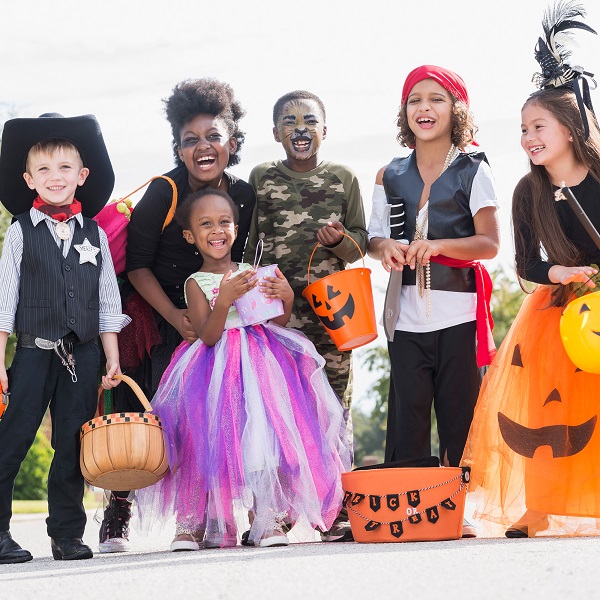 "I get to wear a costume!" | 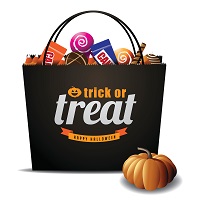 "I will get my bag." |
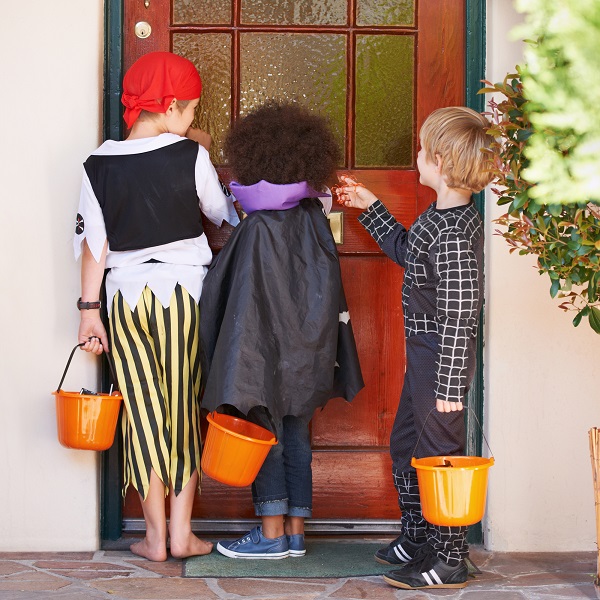 Knock on the doors! | 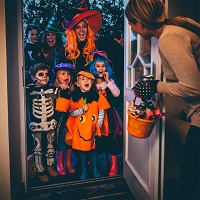 I will say "trick or treat!" | 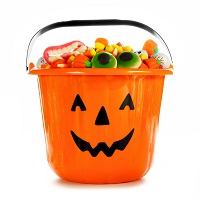 "Thank you for the candy!" |
This Thanksgiving example is a way to review new food words and prepare your little one for what will happen on this special family day. You might add photos of family members who will visit.
 "It is Thanksgiving. We will
have a special dinner.
Uncle Ken will come!" |  "We fixed a turkey. It
smells so good! |  "You love mashed potatoes!
Yum!" |
Hands-On Experience
Experience is the basis for later school learning.
- We learn to read, write, and figure about things, actions, and relationships that we have experienced.
- To learn well in school later, your child needs to simply interact with a rich environment now.
- Does he have safe plastic containers of varied sizes, with and without lids, spouts and handles, to pour out of and into and squirt with in the bathtub or wading pool?
- Does she sit in the shopping cart and see the food come off the shelf, go through the cash register line, into bags, home, and onto shelves in cupboards and refrigerator?
- Do you go for walks and take time to notice leaves emerging or falling, or bugs, or interesting animals in yards?
- In any experience, no matter how ordinary, notice what she is attending to, and attend to it also, with body language, words, and actions.
- You are telling him, Noticing is important. What interests you is worth learning about.
- Curiosity is a virtue. Of course, by creating the opportunities, and taking a turn at calling attention to things yourselves, you will open up her horizons even more. Just don't have all the ideas yourself. She needs to have many of her own.
Print Experience
Awareness of interaction with print in the environment is vital. Your child will benefit from seeing you read. Not only books, but directions, signs, logos, recipes, labels, newspapers, magazines, closed captions (you can introduce this early in preschool), tablets, cell phones, and other text from the internet.
Communicate what you are doing overtly.
- "I need to look up the number on the internet, or, I will find the number in my phone."
- "I need to look for that recipe on my Ipad."
More Helpful Topics